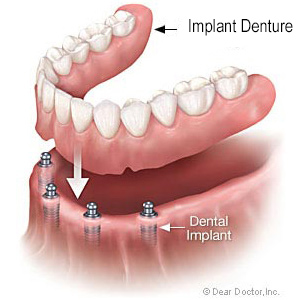Do I have denture stomatitis symptoms if the roof of my mouth is irritated and has patchy spots on it? I went to the dentist for the problem, and she took a quick look and diagnosed me with denture stomatitis. Is that all there is to the diagnosis? Shouldn’t she have taken some kind of test? My dentist told me to work harder and keep my mouth and dentures clean, and the problem should gradually improve. Then, she gave me a pamphlet to read about the condition. That was a frustrating dental visit. I appreciate any insight you can give me. Thanks. Dee from Lansing, MI
What Is Denture Stomatitis?
Denture stomatitis is inflammation and soreness in the mouth that can be aggravated by wearing dentures. Stoma is a Greek word that means mouth or opening. Words that end in “itis” refer to inflammation. Research shows that 70 percent of people who wear dentures are affected by denture stomatitis. In 2013, a study published in The Journal of Prosthetic Dentistry showed that people with Type 2 diabetes are more likely to experience oral inflammation beneath their dentures than people who don’t have diabetes at all. Sixty-one percent of type 2 diabetes patients were affected, while only 38% of non-diabetic denture wearers in the study had denture stomatitis.
What Are Denture Stomatitis Symptoms?
Denture stomatitis symptoms are irritation, soreness, patches, or swelling that can affect your mouth, throat, tongue, gums, inner cheeks, or lips. A dentist can tell if you have the condition by examining your mouth and the pattern of redness or patches on your oral tissue. Also, your dentist may swab your mouth and send the sample to a lab for confirmation. The condition affects each person differently, so you may experience some of the following denture stomatitis symptoms:
- Painful or uncomfortable swallowing
- Sore throat or mouth
- Sores or cracks in the corners of your mouth
- White or red patches in your mouth, including your inner cheeks, gums, lips, tongue, or palate (roof of your mouth)
How Can You Get Relief from Denture Stomatitis?

An implant denture can help minimize the risks of denture stomatitis
You can relieve denture stomatitis by practicing good oral hygiene, getting routine examinations to ensure your denture fits appropriately, and allowing your mouth to rest from dentures. Consider the precautions below:
- Ensure you only receive custom dentures that fit correctly and don’t irritate your gum tissue. If your dentures rest directly on your gums, it increases the chances of irritation.
- Some patients support their dentures with dental implants to prevent dentures from resting on their gums. However, not everyone can afford implant-supported dentures, and not all patients are candidates.
- Keep your mouth and your dentures clean. Rinse your mouth and dentures after meals to remove food debris whenever possible. Food particles beneath a denture can breed bacteria and infection. Smoking can also irritate your gums, encouraging yeast infection in your mouth. Brush your dentures, mouth, tongue, and the roof of your mouth daily.
- Avoid wearing dentures while you sleep. Instead, soak them in fresh water or denture-soaking solution. Your saliva production decreases while you sleep, which increases the chances of bacteria and plaque buildup on your dentures.
- Drink plenty of water to prevent dry mouth and remove acid and bacteria from food.
- Limit your sugar intake.
- Avoid smoking.
- Keep your regularly scheduled dental appointments. A thorough examination by your dentist promotes early detection of oral health issues that may be developing. Inform your dentist immediately if you experience any irritation in your mouth or around your dentures.
Denture stomatitis is not automatic for people with dentures. Partner with your dentist to maintain good oral health and get denture maintenance as needed.
Dr. James Gavrilos, a Barrington, Illinois, accredited cosmetic dentist, sponsors this post.
